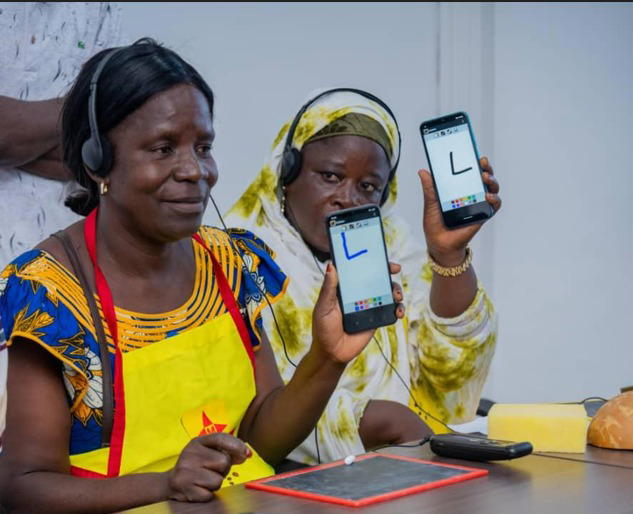How UNESCO, Nestlé rewriting story of women’s literacy in Côte d’Ivoire

By Chioma Obinna
At the Koumassi market in Abidjan, Côte d’Ivoire’s bustling commercial hub, Madam Yonkaho Guinssalou adjusts her wares with one hand — a smartphone in the other.
Just a few years ago, she could not read the numbers on a shopping list, let alone send a text message on a smartphone
“Before, when customers came and gave me paper to buy things, I could not read,” she said with a shy smile, showing the small chalkboard where she had just written her name and phone number.
“Now I can read, write, and even use my phone for business. Before, I was blind. Now I see.”
Madam Yonkaho’s words — “before, I was blind, now I see”, have become a rallying cry for hundreds of market women across Côte d’Ivoire whose lives are being changed by a quiet revolution in learning.
The transformation began with a partnership between Nestlé and UNESCO, aimed at empowering women traders through functional and digital literacy. According to Mrs. Patricia Ekaba, Nestlé’s Corporate Communications and Public Affairs Director for the Central and West Africa Region, the initiative reflects Nestlé’s philosophy of Creating Shared Value by ensuring that business growth also drives community progress.
“We believe the best people to speak about impact are not us, but the beneficiaries themselves,” Ekaba told journalists during a visit to the UNESCO office in Abidjan.
“This is part of how we conduct our business globally to create shared value for individuals, families, communities, and the planet.”
Nestlé’s focus areas comprising nutrition, youth training, women’s autonomy, and environmental responsibility, all converge in the Nestlé, UNESCO partnership.
“What we do with UNESCO speaks to women’s empowerment. What we do with farmers focuses on sustainable production. And what we do with youth builds capacity. Together, it all connects,” Ekabo explained.
Teaching letters through life
For Dr. Yves Sagou, coordinator of UNESCO’s literacy projects, the Nestlé women’s literacy programme is a profound practical model. “This is not just a reading class, its education for living. It’s designed for women traders who are already working in the markets. We meet them where they are.”
Classes are held once a week, usually on Wednesdays, with follow-ups in the market. Trainers use smartphones loaded with a custom digital learning app that combines voiceovers, letter-tracing exercises, and symbolic illustrations to make literacy come alive.
“We teach using ten everyday symbols. For example, a vertical line represents a well-brought-up child. A horizontal line represents a well-managed home. When women draw these, they’re not just forming letters — they’re learning values, ” Sagou explained.
Through these intuitive exercises, women learn to read, write, calculate, and use mobile technology. They also receive lessons on hygiene, family budgeting, stock management, and children’s school follow-up in what Sagou calls “education for the whole woman.”
Many participants juggle family, business, and learning.
To make education accessible, UNESCO’s instructors go directly to the markets. “Some women can’t leave their stalls,” said Dr. Moussa Doumbia, who moderated a recent training session.
“So our teachers meet them where they sell. They teach with patience, with humour, with heart.”
Classes typically last nine months — six for basic literacy and three for “post-literacy,” where women learn record-keeping, savings, and leadership. “The most difficult thing is convincing them to take the first step. But once they start, they never want to stop,” Sagou explained.
UNESCO’s pride, Côte d’Ivoire’s gain
For Mrs. Tené Haïdara, who stood in for UNESCO’s Representative in Côte d’Ivoire, the project marks a milestone in the country’s education policy.
“Before UNESCO and Nestlé launched this initiative, Côte d’Ivoire had no digital literacy programme,” she said. “Now, digital literacy is part of our national strategy, a model we are proud to present internationally. ” The project’s success,” she added, “is a testament to public-private collaboration. This partnership has brought something very positive and innovative,” Haïdara said.
“It’s not just literacy; its dignity restored. It’s inclusion achieved.”
For women like Yonkaho and Fatoumata who joined the programme in 2022, literacy has meant more than letters — it’s meant voice, visibility, and value.
“Before, I couldn’t count money properly. Now we can keep our own records. We don’t depend on anyone to tell us our profit.”
Their pride mirrors that of hundreds of others across the markets of Yopougon, Koumassi, Bouaké, and soon Gagnoa and Yamoussoukro. “We want to reach every woman who still feels left out,” said Ekabo. “Because when a woman learns, a family thrives, and a community grows stronger.”
Beyond the markets
Nestlé’s commitment goes beyond literacy. Its broader sustainability framework spans nutrition research, youth employment, and climate-smart farming.
“What you saw in our research and training centres connects directly to what we do with women and farmers. It’s all one story — creating opportunities that last,” Ekaba said.
From functional literacy to digital inclusion, from cocoa farms to urban markets, the message is the same: empowerment begins with education.
The post How UNESCO, Nestlé rewriting story of women’s literacy in Côte d’Ivoire appeared first on Vanguard News.







